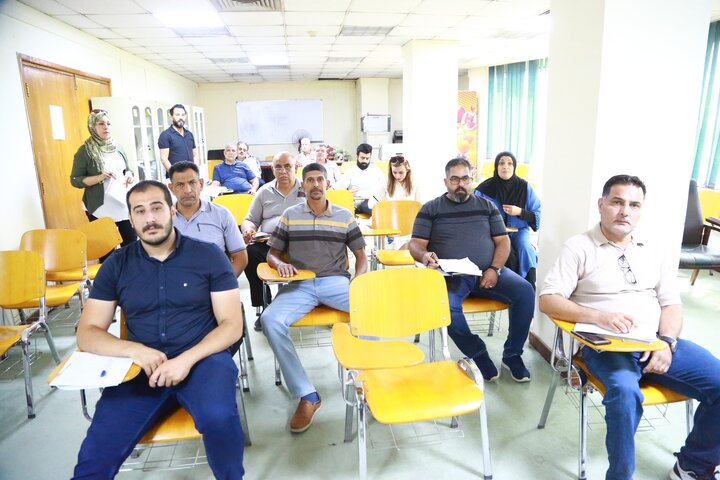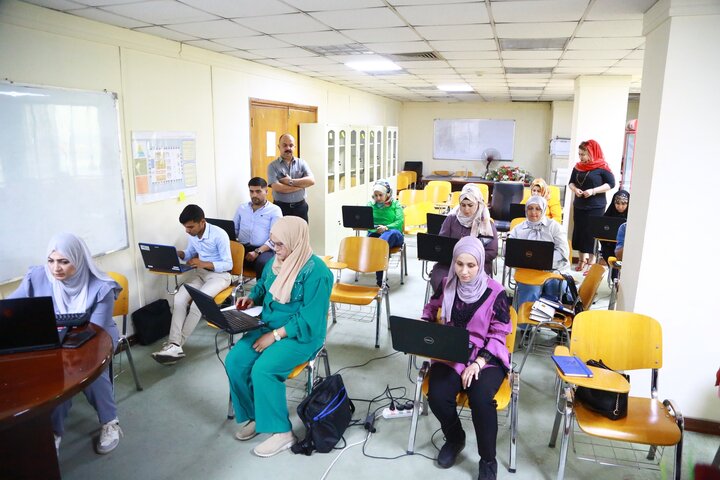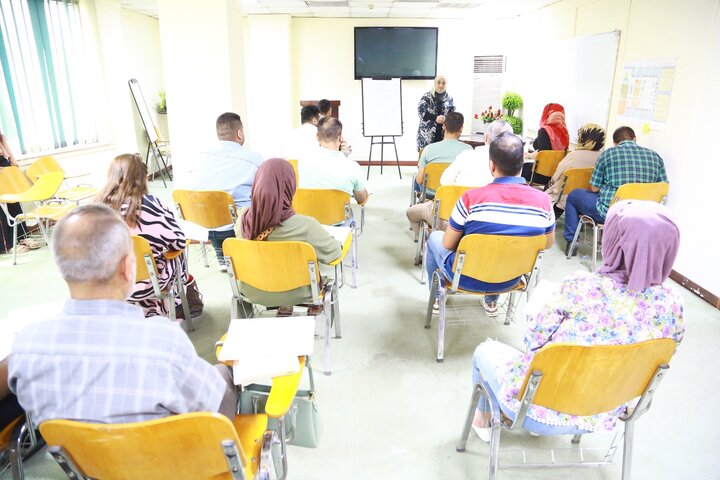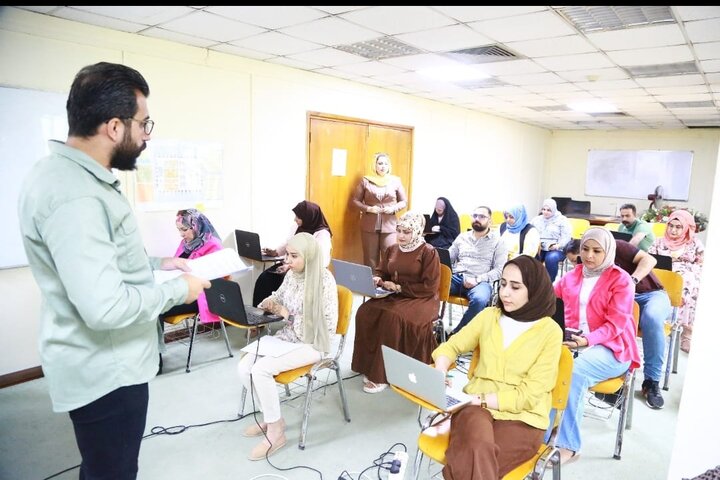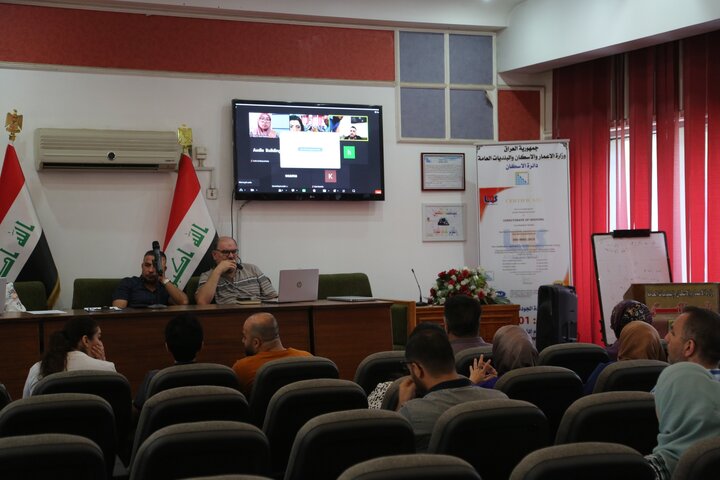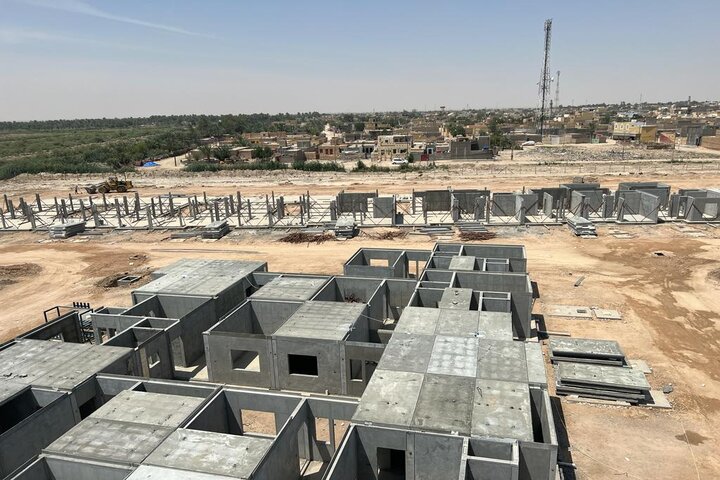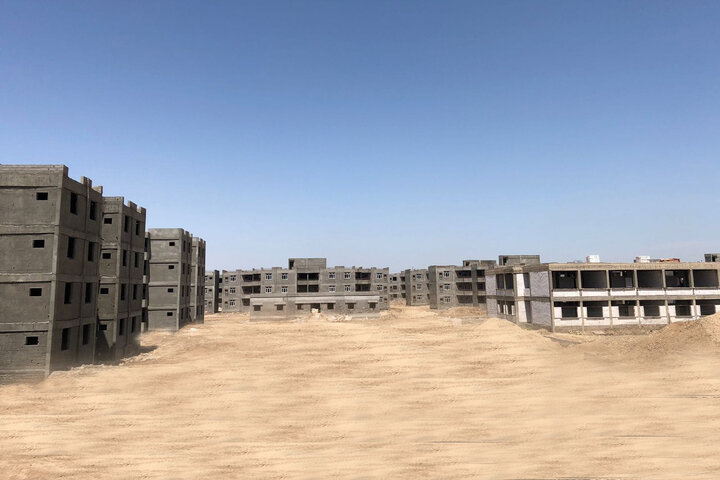Within the curriculum of courses and lectures, and in coordination with the Training and Development Center in the Ministry, the Planning and Follow-up Department / Training and Development Division in the Directorate of Housing one of the formations of the Ministry of Construction, Housing and Public Municipalities organized a training course entitled (Occupational Health and Safety) in which a number of employees in the Directorate and employees of the Ministry’s formations participated.
the aim of the course was:
1-Safety in construction projects (residential complexes) and sick buildings.
2-Educate employees and train them on ways to handle critical cases.
3-Methods of dealing with fires of all kinds and first aid.
The course lasted for five days, in which the staff of the Occupational Safety Division (senior engineer Marwa Wasfi Hamid, technical Director Munther Jaafar Sadiq) lectured. It concluded with an examination for all participants.
A training course entitled (High Strength Concrete Using Additives)
Within the training plan of Planning and Follow-up Department in the Directorate of Housing, one of the formations of the Ministry of Construction, Housing and Public Municipalities, Training and Development Division organized a training course entitled (High-strength concrete using additives). The target group was engineers and workers in the field of on-site execution and concrete production plants.
The aim of the course was: to acquaint the participants with the benefits and components of concrete and their impact on the structural and architectural design of buildings. The course axes were delivered by Eng. Hassan Ali Jaber, which includes:
1. A brief history of the beginning of using this type of concrete
2. Basic concepts of high strength concrete.
3. The idea of high-strength concrete and its production method
4. Raw materials required for the production of high strength concrete 5. The mechanism of adding additives of both types, chemical and mineral, and their effect on the properties of high-strength concrete
6. Comparison between the properties of high strength concrete and ordinary concrete
7. Designing a high-strength concrete mix using additives according to the American method (ACI_Mmethod).
The course concluded with a test for all participants.
Directorate of Housing: organizes a course entitled (Basic Principles of Electricity)
Planning and Follow-up Department / Training and Development Division in the Directorate of Housing, one of the formations of the Ministry of Construction, Housing and Public Municipalities, organized a course entitled (Basic Principles of Electricity).
The course curriculum was presented by Mr. (Refaat Saleh Ahmed) Assistant Technical Director / Security Permits Department at the Directorate’s headquarters on Thursday morning 22/6/2023, with the participation of a number of the Directorate’s employees.
The lecturer discussed several axes related to the basic principles of electricity, including defining the participants on how to connect and establish the electricity circuit, in addition to determining the type of electrical circuits, defining energy sources, and how they reach the consumer.
The aim of the course was to learn how to establish data in a typical way, and how to connect an electrical circuit. The course concluded with all participants undergoing a test to re-review the information and granting the evaluation of the participants’ marks.
Directorate of Housing: organizes a course entitled (Auto cad two-dimensional engineering drawing)
Planning and Follow-up Department / Training and Development Division in the Directorate of Housing, one of the formations of the Ministry of Construction, Housing and Public Municipalities, organized a course entitled (Auto cad two-dimensional engineering drawing). The course curriculum was presented by Eng. (Maryam Rasheed Hammoud), Assistant Chief Engineer, at the Directorate’s headquarters, from Sunday 11/6 to 15/6/2023, with the participation of a number of the Directorate’s employees.
The lecture dealt with several axes related to creating the work environment: preparing the (Gird) and units(Uint), getting acquainted with the list of drawing tools (Draw), in addition to delving into the tools of modification (modify), knowing how to add dimensions (dimension) and writing (TEXT), and a comprehensive clarification of the drawing tools and getting acquainted with the list Modification tools, as well as entering deeply into the preparation of layers (Layers) in the work environment and converting the drawing into printing.
The course concluded with all participants undergoing a test to re-review the information and granting the evaluation of the participants’ marks.
Directorate of Housing: organizes a course entitled (employee duties and rights)
The Planning and Follow-up Department / Training and Development Division in the Directorate of Housing, one of the formations of the Ministry of Construction, Housing and Public Municipalities, organized a course entitled (employee duties and rights) in which the lecturer (Ihsan Khaled Jabri), Senior Chief Translator at the Directorate of Housing headquarters, explained the Disciplinary Law for State and Public Sector Employees No. (14) For the year 1991, indicating the duties and rights of the employee, as well as providing a full explanation of the bonuses and promotions.
The lecturer, Ms. Azraa Hanoun Aliwi, a senior legal advisor at the Directorate’s headquarters, also touched on several axes, including the definition of transparency, integrity and corruption, and showed its manifestations in state institutions, ways to combat it, and the authorities concerned with monitoring transparency of performance in government institutions.
A number of employees from within the Directorate and from the Ministry and its formations participated in the course. The course concluded with an attendance exam for all participants.
Directorate of Housing: organizes a course entitled (Advance Microsoft Word)
The Planning and Follow-up Department / Training and Development Division in the Directorate of Housing, one of the formations of the Ministry of Construction, Housing and Public Municipalities, organized a course entitled (Advance Microsoft Word). The course curriculum was lectured by Mr. (Ahmed Hashim Jassim), a senior programmer at the Directorate of Housing headquarters, from Sunday 28/5 to 1/6/2023, with the participation of a number of the department’s employees. The lecturer dealt with several axes related to the use of the Word program in a detailed manner and at an advanced level:
-Learn how to create a design by default using the Word program, such as making a (C.V) or designing (COVER) a book or magazine.
-Editing using a password, as in websites.
-How to synchronize and recall a file from Excel with Word.
-How to professionally number pages.
The options file was touched upon and some important concepts such as Advanced, Auto save, Customize Ribbon were explained.
The course concluded with all participants undergoing a test to re-review the information and granting the evaluation of the participants’ marks.
Presentation of (Indonesian Audie) Building and Construction Company
Presentation of (Indonesian Audie) Building and Construction Company
Department of Information and Communication Technology in the Directorate of Housing, one of the formations of the Ministry of Construction, Housing and Public Municipalities, organized a presentation via (Zoom) program, in the presence of a number of engineers from Authentication and Projects Departments in our Directorate and the Indonesian company (Audie) specialized in building and construction, with the assistance of Ms. (Reem Khaled) a translator at Division of Relations and Media.
Where the company’s capabilities in executing low-cost housing projects were presented using:
1-Audi container prefab.
2-Audi frame.
3-Audi frame – light steel.
4-Audi panel.
5-Audi panel – lightweight concrete panel.
The axes of the presentation were between the representatives of the company and the engineers of our Directorate regarding the method of execution, the cost, and the duration of the completion of the housing unit, as the company explained that the cost per square meter ranges from $100 to $200 for a period of two weeks for one house.
The aim of the presentation was to exchange experiences and introduce modern, low-cost and environmentally friendly technologies.
The company will be provided with models of low-cost residential house designs to be studied in terms of cost and execution period using the above techniques.
The Directorate of Housing: continues to supervise work on Al-Shinafiyah housing project in Diwaniyah Governorate
The engineering and technical cadres working in the Directorate of Housing, one of the formations of the Ministry of Construction, Housing and Public Municipalities, continue to supervise the work on Al-Shinafiyah residential project in Al-Diwaniyah Governorate, which is being executed by Ashur General Contracting Company (formerly Al-Rasheed Company) with a completion rate of 41% and a cost of (43,840,000,000) billion dinars.
The project consists of a group of residential houses (331) house distributed in two models:
-The first model has an area of one house (127.5) square meters and contains three bedrooms, with a number of (203) houses.
-The second model has an area of one house (116) square meters, and it contains two bedrooms, with a number of (128) houses.
Al-Shinafiyah residential complex was built to be an integrated complex in terms of services, as it contains service buildings (primary school consisting of 12 classrooms, market and health center) with the following service networks (pure water network, fire, irrigation, rain water, heavy water, internal and external electricity, and the telephone network) in addition to the external site works (streets – sidewalks – walkways – parking lots) and landscape works (yards – rest areas – gardening – afforestation – furniture and others).
The Directorate of Housing: Organizes a course entitled (Drawing on the Sketchup program)
Planning and Follow-up Department / Training and Development Division in the Directorate of Housing, one of the formations of the Ministry of Construction, Housing and Public Municipalities, organized a course entitled (Drawing on the Skatchup program).
The course curriculum was lectured by Eng. (Zeina Habib), Senior Chief Engineer in the Certification and Engineering Consultancy Department, Architectural Designs Division, at the Directorate of Housing headquarters, on Thursday morning, 18/5/2023, with the participation of a number of engineers specialized in this field.
The lecturer touched on the axis of definition and explanation of this program, which is one of the three-dimensional engineering drawing programs, through which engineering shapes are formed and housing and non-housing projects are realistically shown, and it is considered a form of engineering development in the field of housing projects.
The aim of the course was how to use the program in order for the participants to present small 3D projects, and they were evaluated on the basis of that.
Al-Suwaira residential project in Wasit Governorate
The Directorate of Housing, one of the formations of the Ministry of Construction, Housing and Public Municipalities, continues to work on Al-Suwaira housing project in Wasit Governorate, with a completion rate of 74%, as the contract cost for the project after the appeal amounted to (69,726,000,000) billion dinars, and the number of housing units amounted to (640) apartment.
The project was designed in the form of multi-storey residential buildings (four floors), with two models of residential buildings:
Type (A) = (40) buildings, (480 apartments)
Type (B) = (10) buildings, (160 apartments)
The residential complex contains public service buildings: kindergarten, nursery, primary school with a capacity of 18 classrooms , (2) intermediate schools with a capacity of 12 classrooms, markets, health center, administrative building and (2) guard rooms with service networks (pure water and fire, rainwater drainage network, heavy water sewage network with heavy water treatment unit, external and internal electrical networks, telephone) as well as external site works (external fence, streets, sidewalks, parking lots) and also contains landscape works (yards and rest spaces, garden organization, afforestation and furniture).




